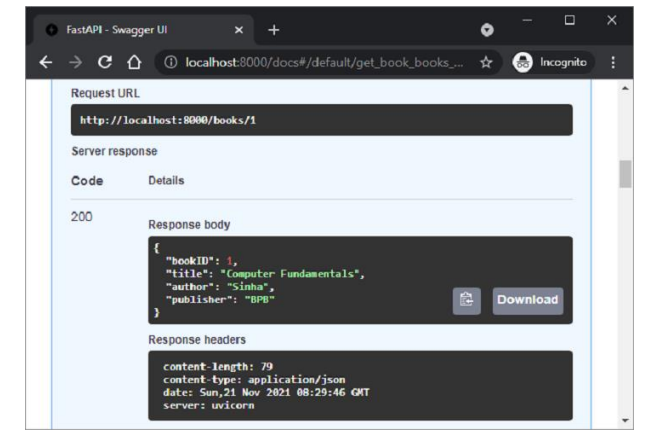
- FastAPI教程
- FastAPI - 主页
- FastAPI - 简介
- FastAPI - 你好世界
- FastAPI-开放API
- FastAPI - Uvicorn
- FastAPI - 类型提示
- FastAPI - IDE 支持
- FastAPI - 休息架构
- FastAPI - 路径参数
- FastAPI - 查询参数
- FastAPI - 参数验证
- FastAPI - Pydantic
- FastAPI - 请求正文
- FastAPI - 模板
- FastAPI - 静态文件
- FastAPI - HTML 表单模板
- FastAPI - 访问表单数据
- FastAPI - 上传文件
- FastAPI - Cookie 参数
- FastAPI - 标头参数
- FastAPI - 响应模型
- FastAPI - 嵌套模型
- FastAPI - 依赖关系
- FastAPI - CORS
- FastAPI - Crud 操作
- FastAPI - SQL 数据库
- FastAPI - 使用 MongoDB
- FastAPI - 使用 GraphQL
- FastAPI - Websocket
- FastAPI - FastAPI 事件处理程序
- FastAPI - 安装子应用程序
- FastAPI - 中间件
- FastAPI - 安装 Flask 应用程序
- FastAPI - 部署
- FastAPI 有用资源
- FastAPI - 快速指南
- FastAPI - 有用的资源
- FastAPI - 讨论
FastAPI - 使用 MongoDB
FastAPI 还可以使用 NoSQL 数据库(例如 MongoDB、Cassandra、CouchDB 等)作为 REST 应用程序的 CRUD 操作的后端。在本主题中,我们将了解如何在 FastAPI 应用程序中使用 MongoDB。
MongoDB 是一个面向文档的数据库,其中半结构化文档以 JSON 等格式存储。文档可以包含许多不同的键值对,或键数组对,甚至嵌套文档。它是一个键值对的集合,类似于Python的字典对象。一个或多个此类文档存储在集合中。
MongoDB 中的 Collection 相当于关系数据库中的表。但是,MongoDB(与所有 NoSQL 数据库一样)没有预定义的架构。文档类似于基于 SQL 的关系数据库表中的单行。每个文档可以具有可变数量的键值对。因此,MongoDB 是一个无模式数据库。
要将 MongoDB 与 FastAPI 结合使用,必须在计算机上安装 MongoDB 服务器。我们还需要安装PyMongo,这是 MongoDB 的官方 Python 驱动程序。
pip3 install pymongo
在通过 Python 和 FastAPI 代码与 MongoDB 数据库交互之前,请通过发出以下命令确保 MongoDB 正在运行(假设 MongoDB 服务器安装在 e:\mongodb 文件夹中)。
E:\mongodb\bin>mongod .. waiting for connections on port 27017
PyMongo 模块中MongoClient类的一个对象是 Python 与 MongoDB 服务器交互的句柄。
from pymongo import MongoClient client=MongoClient()
我们将 Book 定义为 BaseModel 类来填充请求正文(与 SQLite 示例中使用的相同)
from pydantic import BaseModel from typing import List class Book(BaseModel): bookID: int title: str author:str publisher: str
设置 FastAPI 应用程序对象 -
from fastapi import FastAPI, status app = FastAPI()
POST 操作装饰器将“/add_new”作为 URL 路由并执行add_book()函数。它将 Book BaseModel 对象解析为字典,并在测试数据库的 BOOK_COLLECTION 中添加文档。
@app.post("/add_new", status_code=status.HTTP_201_CREATED)
def add_book(b1: Book):
"""Post a new message to the specified channel."""
with MongoClient() as client:
book_collection = client[DB][BOOK_COLLECTION]
result = book_collection.insert_one(b1.dict())
ack = result.acknowledged
return {"insertion": ack}
通过访问 http://localhost:8000/docs 使用 Swagger UI 的 Web 界面添加一些文档。您可以在 MongoDB 的 Compass GUI 前端验证集合。

要检索所有书籍的列表,让我们包含以下获取操作函数- get_books()。当访问“/books” URL路由时会执行。
@app.get("/books", response_model=List[str])
def get_books():
"""Get all books in list form."""
with MongoClient() as client:
book_collection = client[DB][BOOK_COLLECTION]
booklist = book_collection.distinct("title")
return booklist
在这种情况下,服务器响应将是图书集合中所有标题的列表。
[ "Computer Fundamentals", "Python Cookbook", "Let Us Python" ]
下面的 GET 装饰器检索与给定 ID 相对应的书籍文档作为路径参数 -
@app.get("/books/{id}", response_model=Book)
def get_book(id: int):
"""Get all messages for the specified channel."""
with MongoClient() as client:
book_collection = client[DB][BOOK_COLLECTION]
b1 = book_collection.find_one({"bookID": id})
return b1
Swagger UI 文档页面显示以下界面 -

执行上述函数时,服务器的 JSON 响应如下 -
